Oscar Murillo
Horizontal Darkness In Search Of Solidarity
08 Nov 2019 - 26 Jan 2020
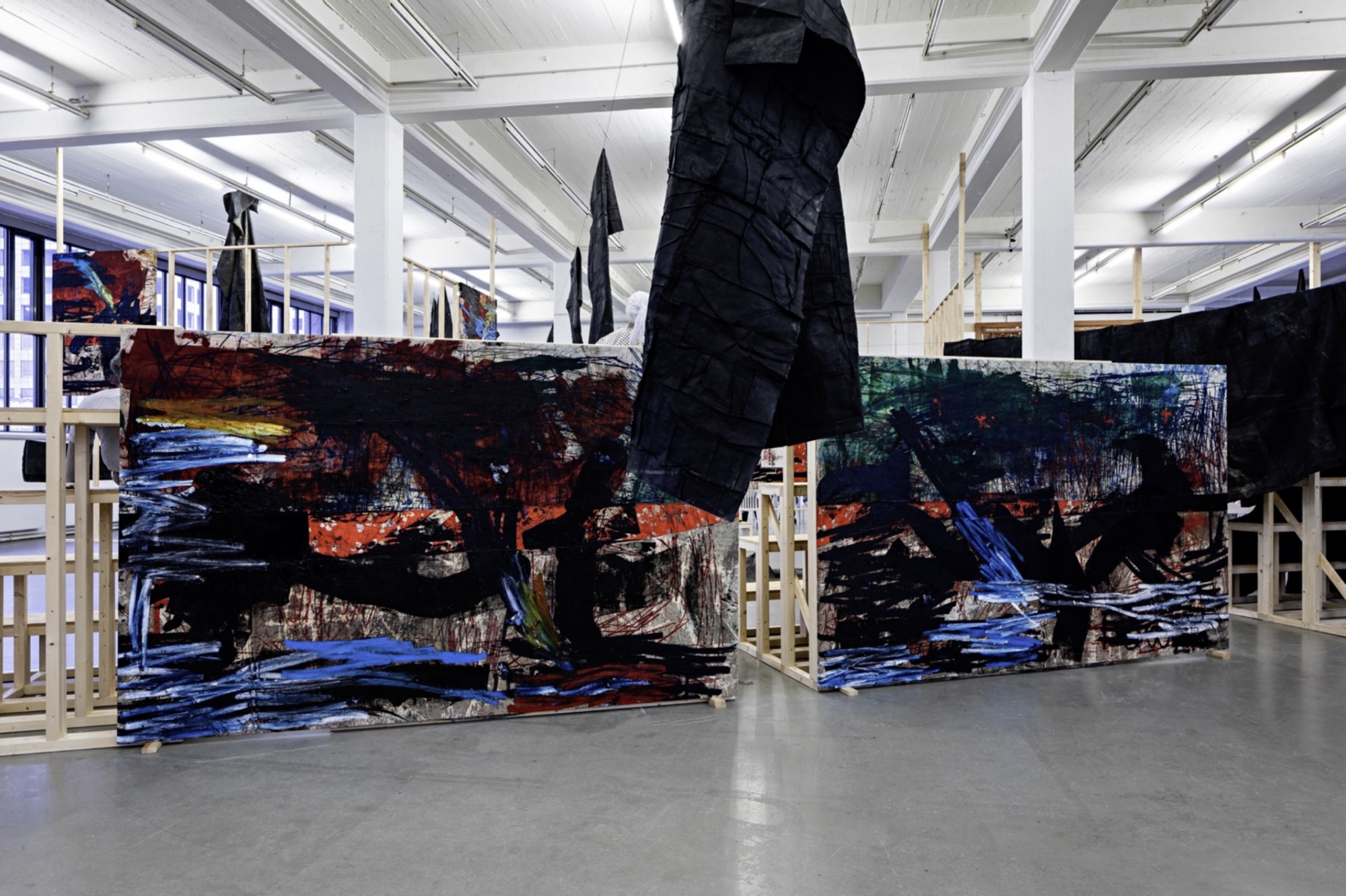
Oscar Murillo, Horizontal Darkness in Search of Solidarity, installation view at Kunstverein in Hamburg, 2019, photo: Fred Dott
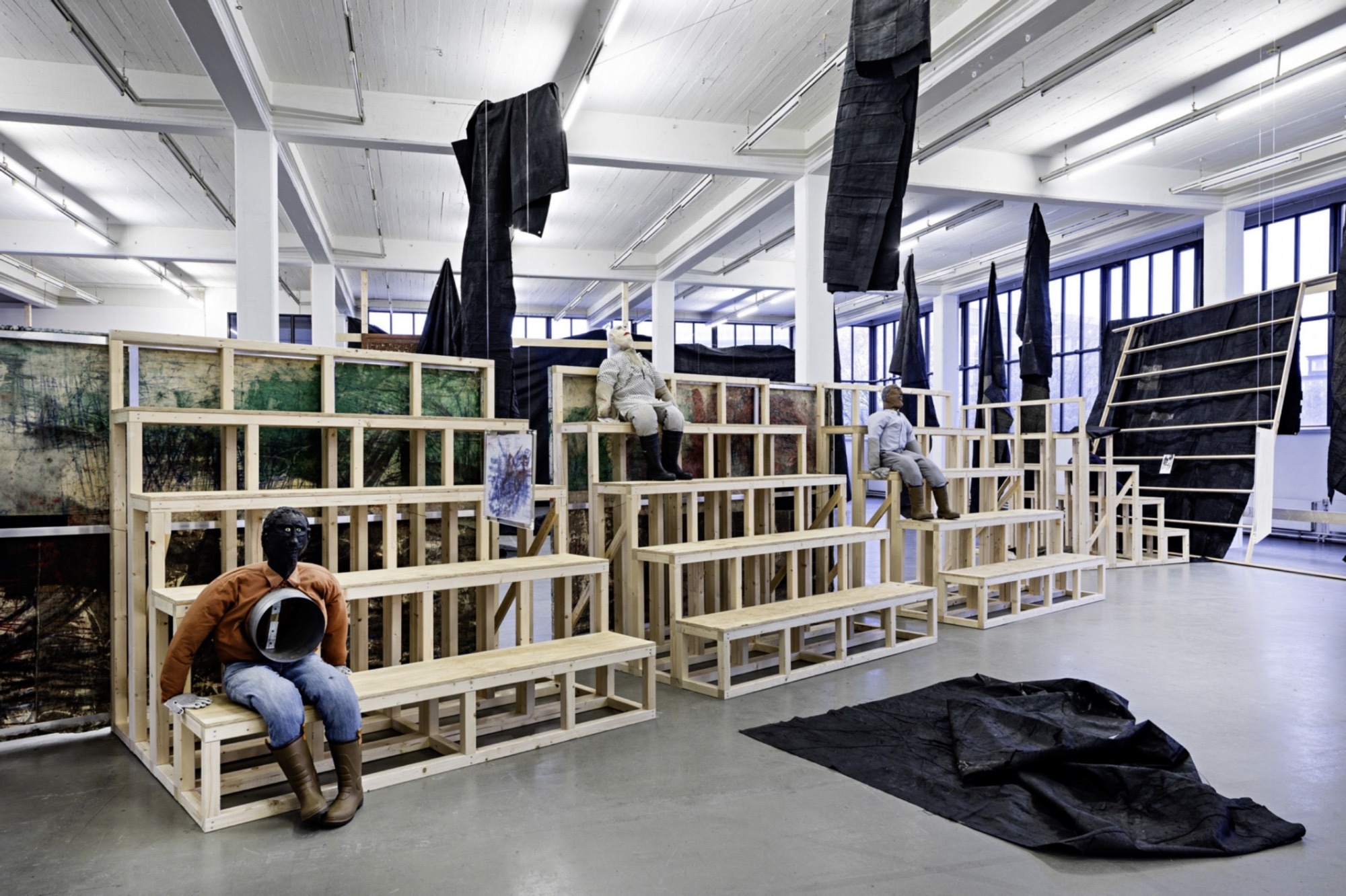
Oscar Murillo, Horizontal Darkness in Search of Solidarity, installation view at Kunstverein in Hamburg, 2019, photo: Fred Dott
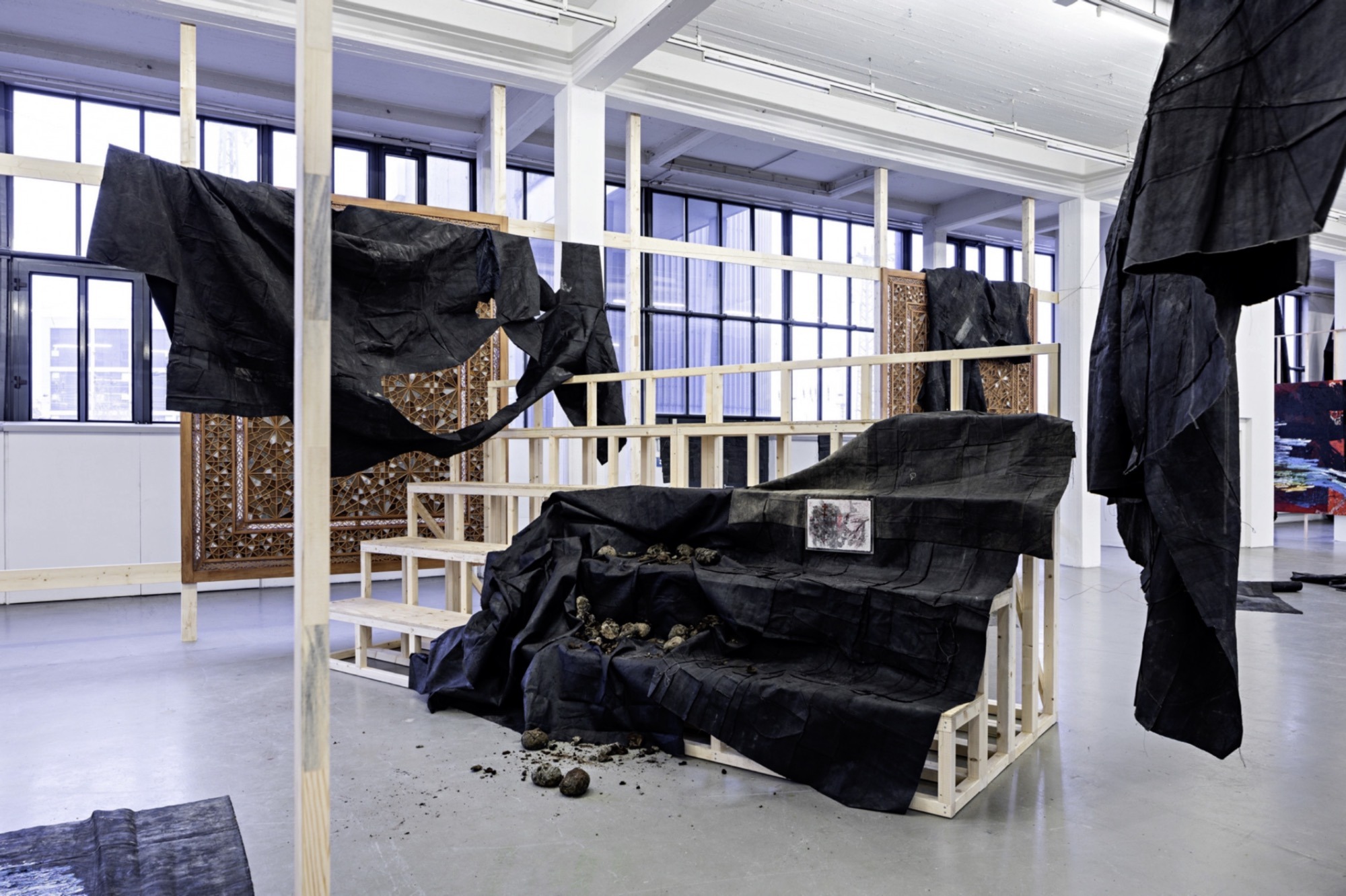
Oscar Murillo, Horizontal Darkness in Search of Solidarity, installation view at Kunstverein in Hamburg, 2019, photo: Fred Dott
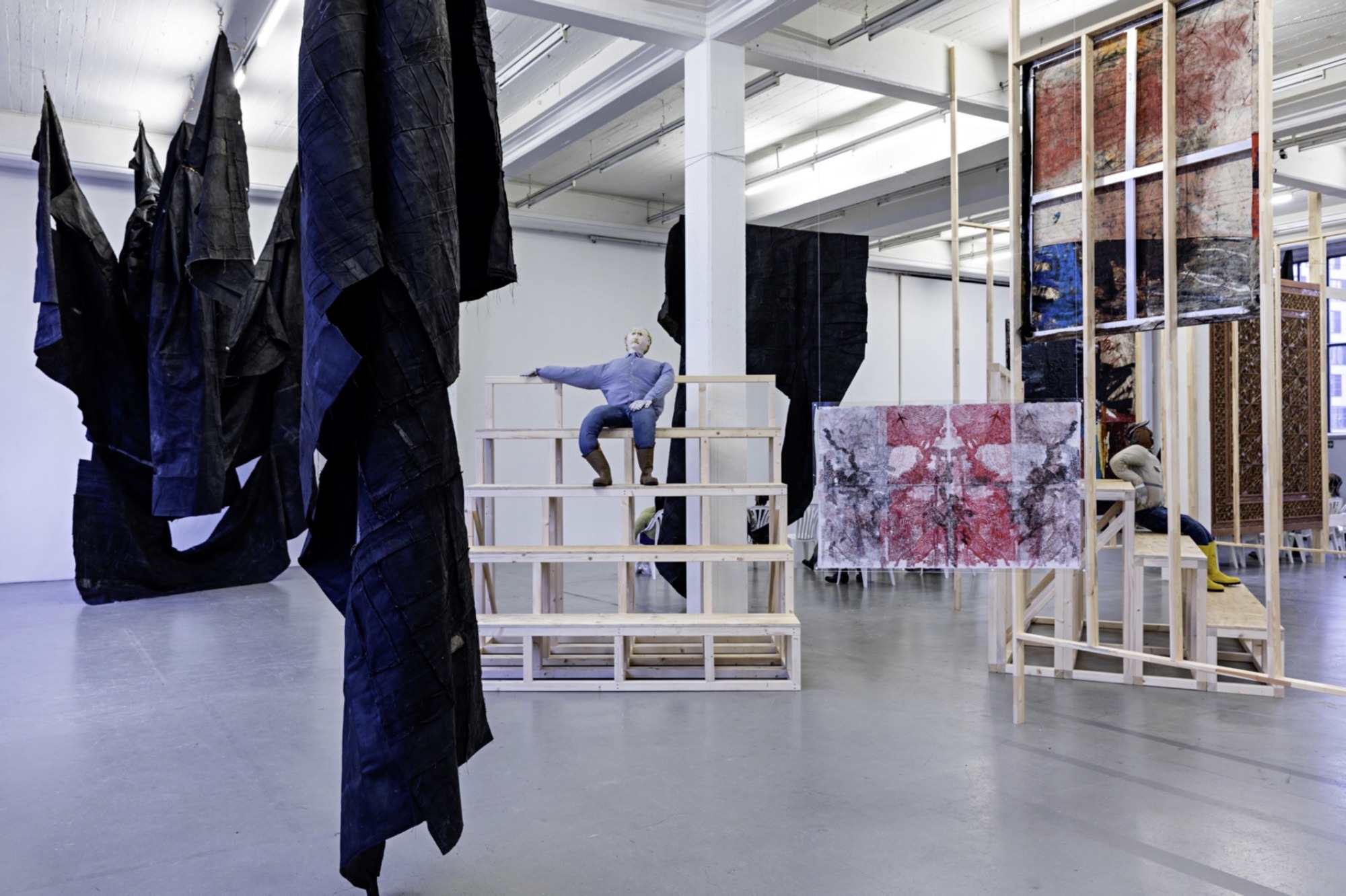
Oscar Murillo, Horizontal Darkness in Search of Solidarity, installation view at Kunstverein in Hamburg, 2019, photo: Fred Dott
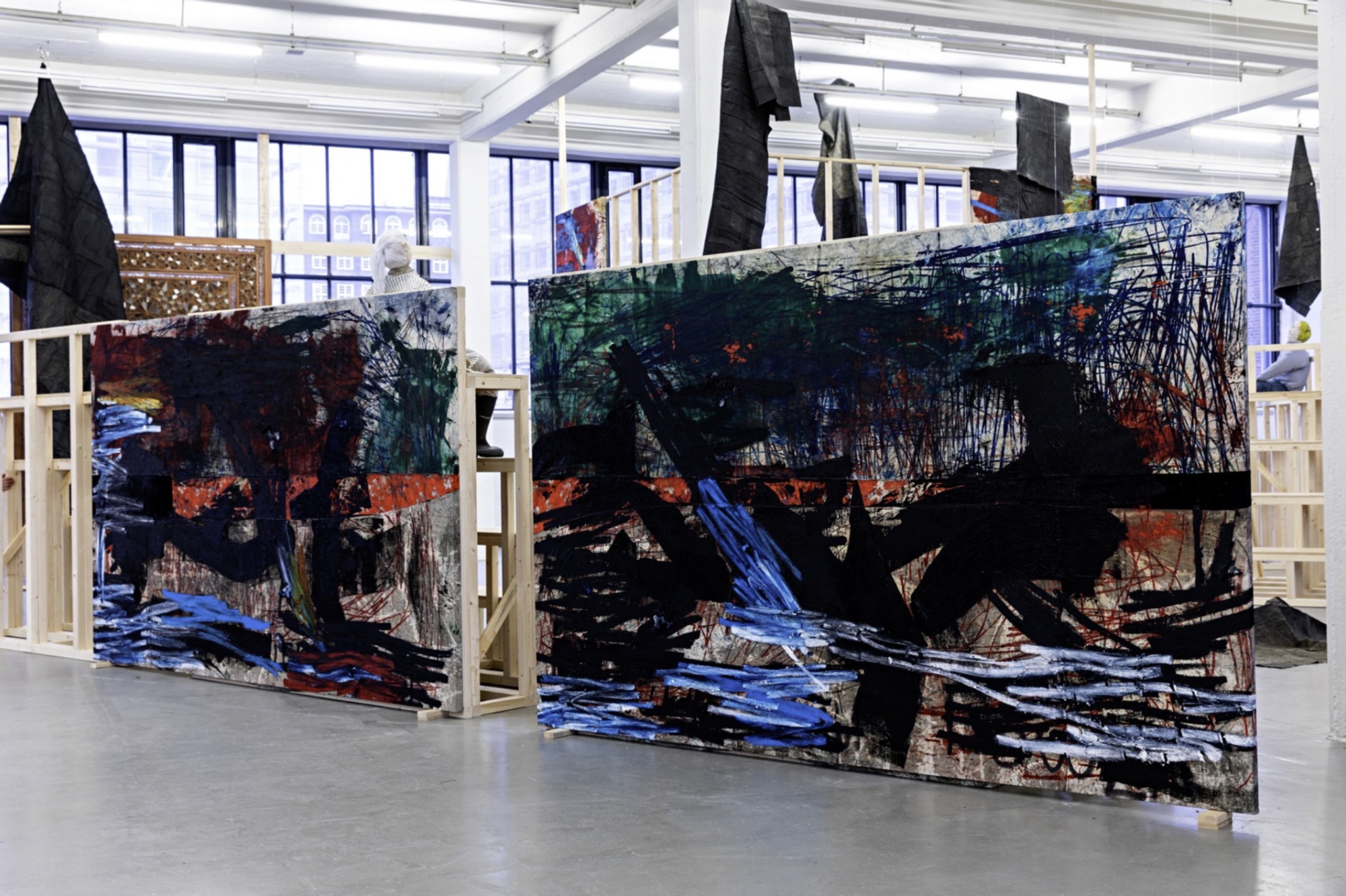
Oscar Murillo, Horizontal Darkness in Search of Solidarity, installation view at Kunstverein in Hamburg, 2019, photo: Fred Dott
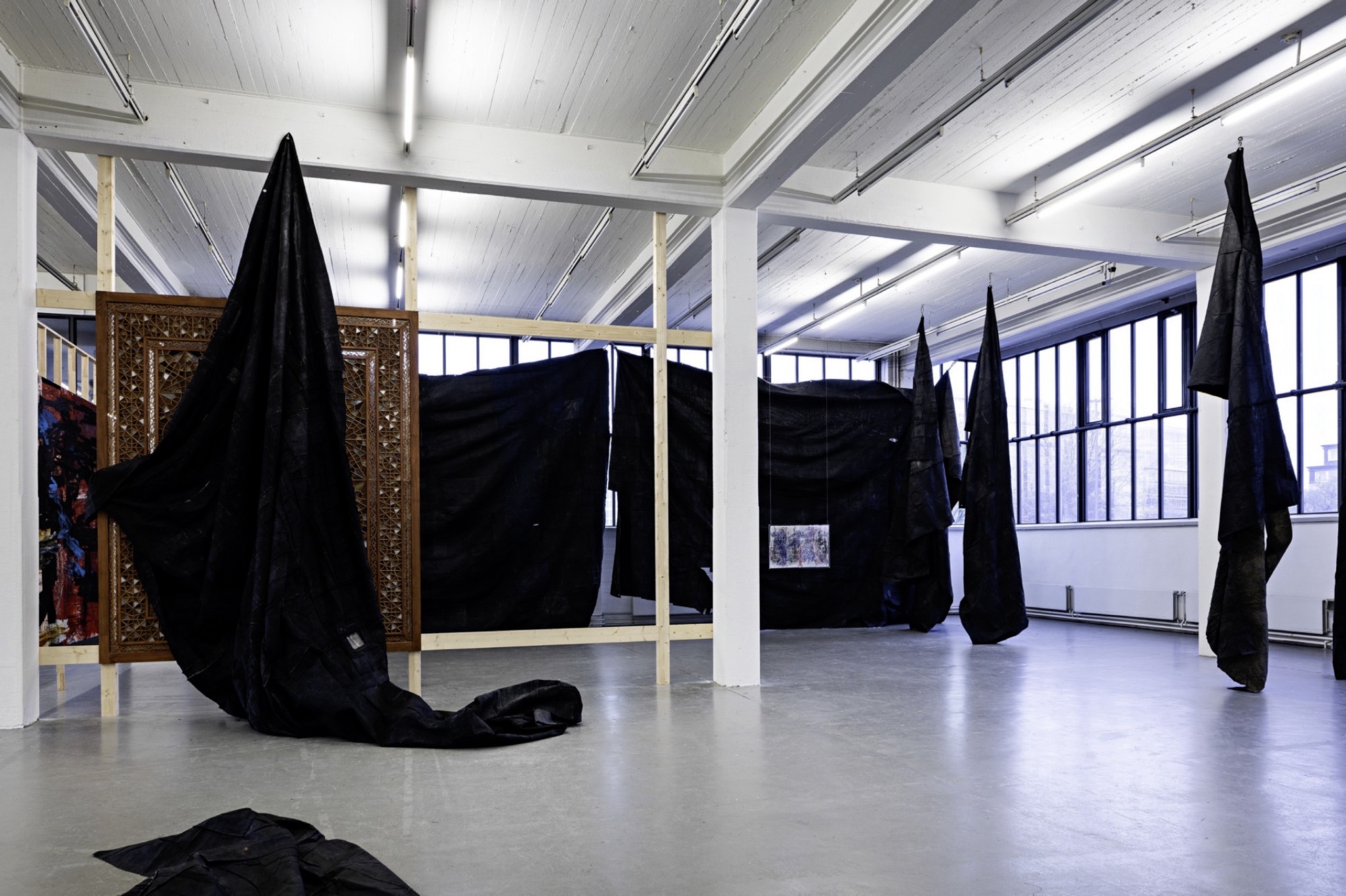
Oscar Murillo, Horizontal Darkness in Search of Solidarity, installation view at Kunstverein in Hamburg, 2019, photo: Fred Dott
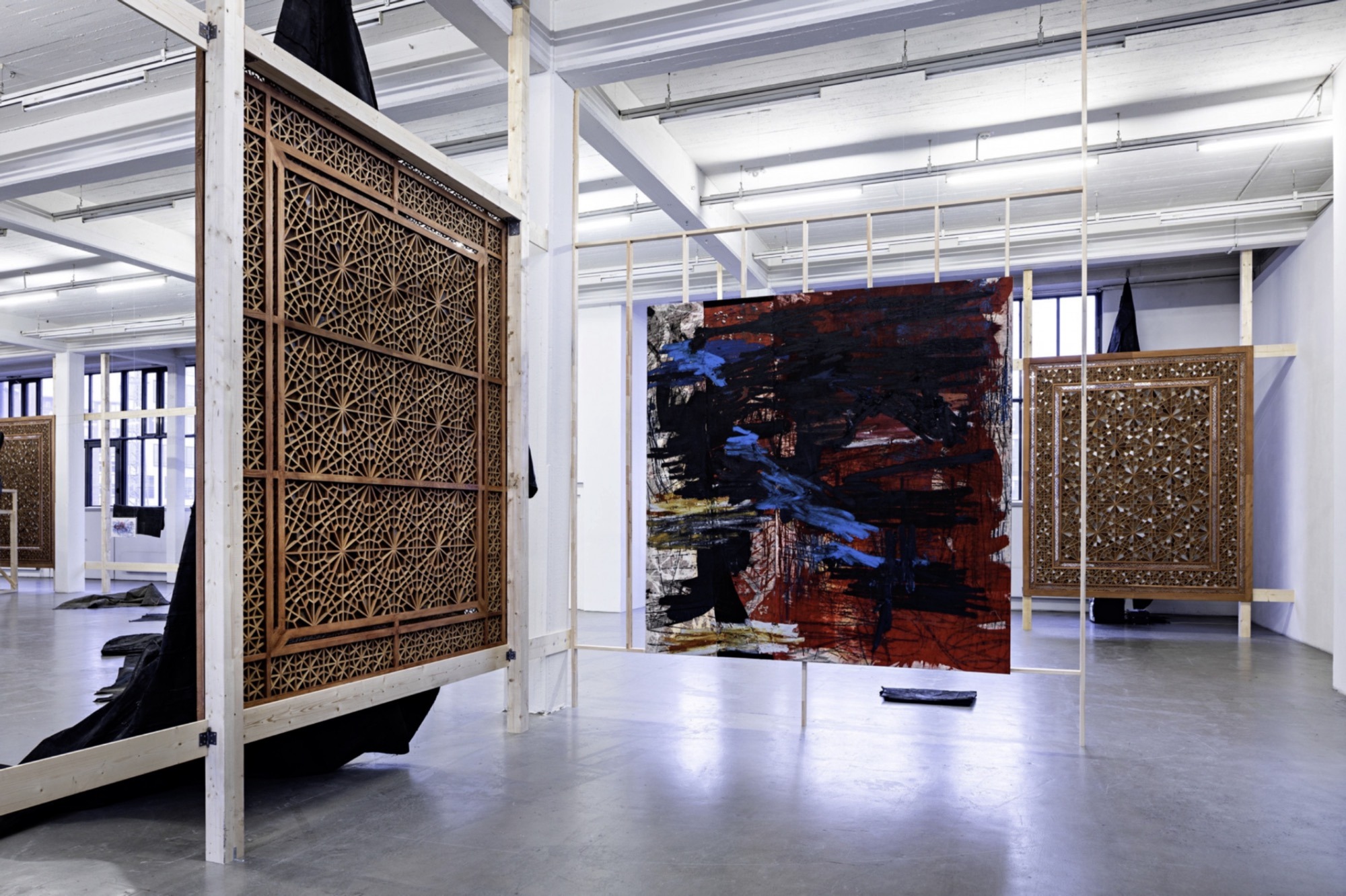
Oscar Murillo, Horizontal Darkness in Search of Solidarity, installation view at Kunstverein in Hamburg, 2019, photo: Fred Dott
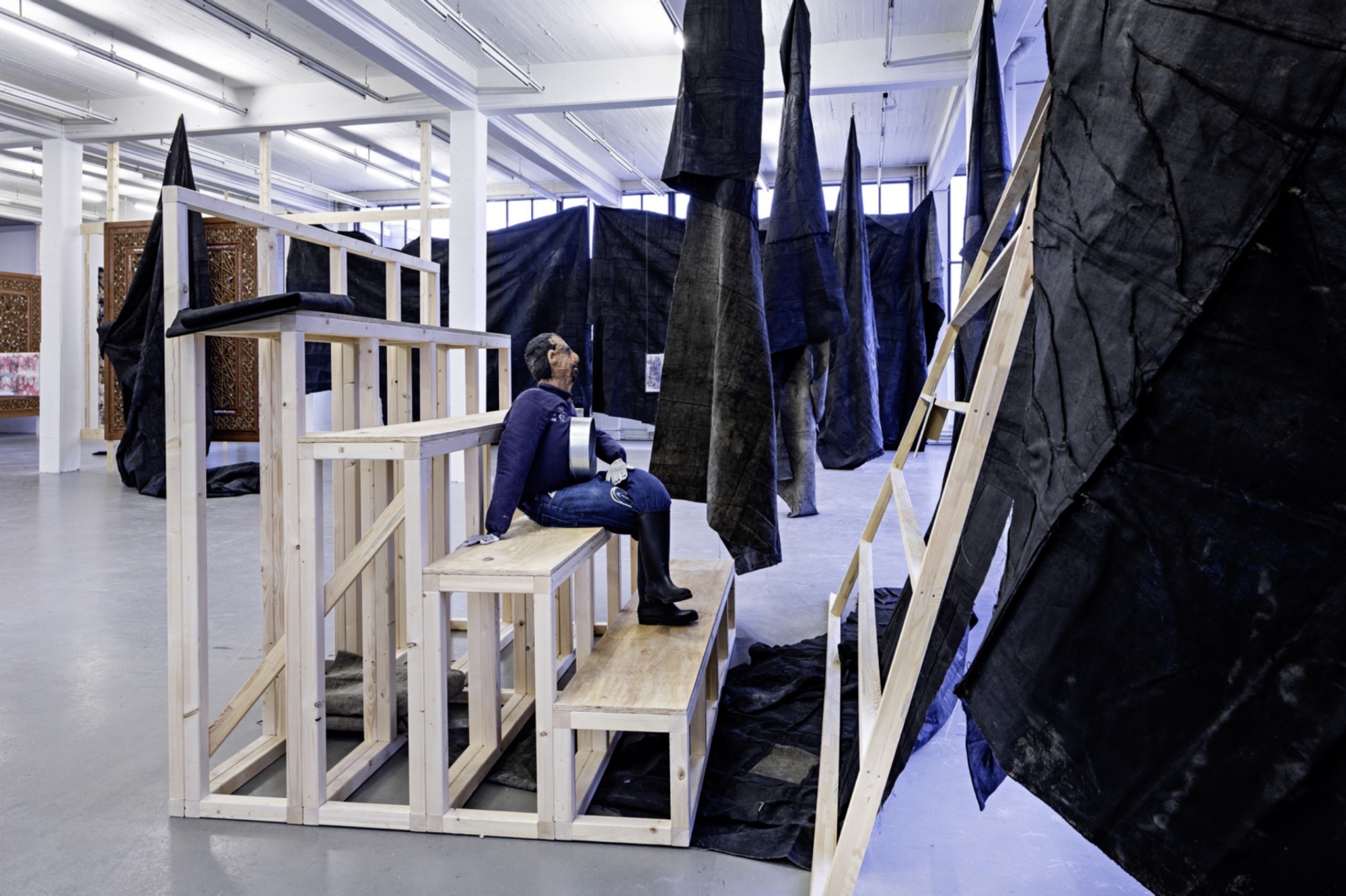
Oscar Murillo, Horizontal Darkness in Search of Solidarity, installation view at Kunstverein in Hamburg, 2019, photo: Fred Dott
OSCAR MURILLO
Horizontal Darkness In Search Of Solidarity
8 November 2019 - 26 January 2020
Lively little flags. The rustic roof full of life. Restaurant. Corina sits at a stone table on a rough-hewn bench. She suffers from anxiety that goes from her empty stomach to her aching head. She lights the last cigarette from the empty pack she tears into little colored strips of paper.
Patrícia Galvão, Industrial Park (1933)
Patrícia Galvão’s hard-hitting novel Industrial Park vividly portrays the turbulent life of workers in Brazil during the 1930s. Poverty, exploitation, Marxist turmoil and trade-union activism are omnipresent; a workers’ strike is brutally put down. From the perspective of three women, Galvão describes an environment where sharing salted popcorn with a lover is ultimately more real than all the talk of the triumph of the proletariat. People show solidarity, stick together and fight to improve their situation in the face of all setbacks. Galvão dissects a world that is, for all its differences, frighteningly close to the social and political situation of today. It is a world that offers deep insights into how Oscar Murillo (*1986 in La Paíla, Colombia) approaches the subject of labor and what he understands by solidarity. Galvão shines a light onto the effects of industrialisation on São Paulo and describes its working class, which was made up of many immigrants, especially from Europe. These immigrants were exploited as a labor force, yet at the same time they developed new ideas in the fight against poor working conditions, which were, moreover, often publicized by the women among them, who were also being sexually exploited.
Murillo is an artist who undermines expectations: primarily working in painting, he goes beyond its limits by integrating video, drawing, sculpture and performance in impressive environmental installations. He has transformed the Kunstverein’s main hall into an agora reflecting his enduring belief in geographic, cultural and sociopolitical solidarity. In this work, titled Horizontal Darkness in Search of Solidarity, large canvases from the manifestation series meet the artist’s effigies—stuffed dolls symbolizing the ordinary people of his Colombian hometown. Visitors are invited to sit down on a number of stepped seating structures that double up as a site for the accompanying events program while serving as a vantage point for visitors to take in the scene and observe the agora as a site of debate.
The canvases making up the manifestation series are sewn together from sections of earlier paintings and other pieces of fabric and then painted, creating a collage effect in which the different energies of the various painted planes are consciously juxtaposed. Characterised by dense, aggressive bursts of colour—most frequently black—the works represent a play between gesture and signification. On each canvas, repeated letters of the alphabet are painted and then eradicated, almost without visible trace. The title of the series plays with the notions of making something manifest and the creation of meaning. The word additionally has a political connotation, as a common term for a political protest in several languages. Thus the idea of physical presence or gesture also points to the act of using one’s body to demonstrate dissent in the face of power.
The manifestation series is complemented by an installation of colour-soaked black canvases, sculpted windows commissioned from craftspeople in Azerbaijan, and Murillo’s flight # drawings, which offer a record of the time that the artist has spent in transit. These ballpoint-pen drawings bring to mind a multilayered stream of consciousness, a complex chain of thoughts and information that records and documents the artist’s thought processes. Flying, which ensures a physical distance from the ground, creates a crack in time. However, since flight routes are determined by political landscapes thousands of metres below (national borders, travel and trade routes, etc.), the dynamics of flying are inextricably linked to the laws of the ground. Nevertheless, flight offers the artist the opportunity to observe current social conditions through a more horizontal and abstract lens. Alongside the flight # drawings, the exhibition showcases video works that address questions of mobility and explore the perpetual state of flux embodied in the drawings. The windows were created using traditional stained-glass techniques, but instead of being made of iridescent glass they are made of rusted sheet metal from run-down factories, symbolising the run-down globalisation scrap of our time.
Murillo is interested in materials, process and labor as well as issues of migration, community, exchange and trade in today’s globalised world. These concerns are deeply embedded in Murillo’s personal history and creative process. Links to everyday life, culture and labor conditions in the industrial town of La Paíla where he was born reappear throughout his work.
A publication on the exhibition will be published in spring 2020 together with Kettle's Yard, Cambridge.
Oscar Murillo was awarded his BFA in 2007 from the University of Westminster, London, followed by an MFA in 2012 from the Royal College of Art, London. His works and projects have been the subject of solo and group exhibitions at prominent institutions worldwide, most recently at the chi K11 art museum, Shanghai (2019); Haus der Kunst, Munich (2017); CAPC musée d’art contemporain de Bordeaux (2017); and Jeu de Paume, Paris (2017). Murillo’s work was also featured in the 2018 Berlin Biennale. Murillo is among the nominees for the 2019 Turner Prize.
Horizontal Darkness In Search Of Solidarity
8 November 2019 - 26 January 2020
Lively little flags. The rustic roof full of life. Restaurant. Corina sits at a stone table on a rough-hewn bench. She suffers from anxiety that goes from her empty stomach to her aching head. She lights the last cigarette from the empty pack she tears into little colored strips of paper.
Patrícia Galvão, Industrial Park (1933)
Patrícia Galvão’s hard-hitting novel Industrial Park vividly portrays the turbulent life of workers in Brazil during the 1930s. Poverty, exploitation, Marxist turmoil and trade-union activism are omnipresent; a workers’ strike is brutally put down. From the perspective of three women, Galvão describes an environment where sharing salted popcorn with a lover is ultimately more real than all the talk of the triumph of the proletariat. People show solidarity, stick together and fight to improve their situation in the face of all setbacks. Galvão dissects a world that is, for all its differences, frighteningly close to the social and political situation of today. It is a world that offers deep insights into how Oscar Murillo (*1986 in La Paíla, Colombia) approaches the subject of labor and what he understands by solidarity. Galvão shines a light onto the effects of industrialisation on São Paulo and describes its working class, which was made up of many immigrants, especially from Europe. These immigrants were exploited as a labor force, yet at the same time they developed new ideas in the fight against poor working conditions, which were, moreover, often publicized by the women among them, who were also being sexually exploited.
Murillo is an artist who undermines expectations: primarily working in painting, he goes beyond its limits by integrating video, drawing, sculpture and performance in impressive environmental installations. He has transformed the Kunstverein’s main hall into an agora reflecting his enduring belief in geographic, cultural and sociopolitical solidarity. In this work, titled Horizontal Darkness in Search of Solidarity, large canvases from the manifestation series meet the artist’s effigies—stuffed dolls symbolizing the ordinary people of his Colombian hometown. Visitors are invited to sit down on a number of stepped seating structures that double up as a site for the accompanying events program while serving as a vantage point for visitors to take in the scene and observe the agora as a site of debate.
The canvases making up the manifestation series are sewn together from sections of earlier paintings and other pieces of fabric and then painted, creating a collage effect in which the different energies of the various painted planes are consciously juxtaposed. Characterised by dense, aggressive bursts of colour—most frequently black—the works represent a play between gesture and signification. On each canvas, repeated letters of the alphabet are painted and then eradicated, almost without visible trace. The title of the series plays with the notions of making something manifest and the creation of meaning. The word additionally has a political connotation, as a common term for a political protest in several languages. Thus the idea of physical presence or gesture also points to the act of using one’s body to demonstrate dissent in the face of power.
The manifestation series is complemented by an installation of colour-soaked black canvases, sculpted windows commissioned from craftspeople in Azerbaijan, and Murillo’s flight # drawings, which offer a record of the time that the artist has spent in transit. These ballpoint-pen drawings bring to mind a multilayered stream of consciousness, a complex chain of thoughts and information that records and documents the artist’s thought processes. Flying, which ensures a physical distance from the ground, creates a crack in time. However, since flight routes are determined by political landscapes thousands of metres below (national borders, travel and trade routes, etc.), the dynamics of flying are inextricably linked to the laws of the ground. Nevertheless, flight offers the artist the opportunity to observe current social conditions through a more horizontal and abstract lens. Alongside the flight # drawings, the exhibition showcases video works that address questions of mobility and explore the perpetual state of flux embodied in the drawings. The windows were created using traditional stained-glass techniques, but instead of being made of iridescent glass they are made of rusted sheet metal from run-down factories, symbolising the run-down globalisation scrap of our time.
Murillo is interested in materials, process and labor as well as issues of migration, community, exchange and trade in today’s globalised world. These concerns are deeply embedded in Murillo’s personal history and creative process. Links to everyday life, culture and labor conditions in the industrial town of La Paíla where he was born reappear throughout his work.
A publication on the exhibition will be published in spring 2020 together with Kettle's Yard, Cambridge.
Oscar Murillo was awarded his BFA in 2007 from the University of Westminster, London, followed by an MFA in 2012 from the Royal College of Art, London. His works and projects have been the subject of solo and group exhibitions at prominent institutions worldwide, most recently at the chi K11 art museum, Shanghai (2019); Haus der Kunst, Munich (2017); CAPC musée d’art contemporain de Bordeaux (2017); and Jeu de Paume, Paris (2017). Murillo’s work was also featured in the 2018 Berlin Biennale. Murillo is among the nominees for the 2019 Turner Prize.
